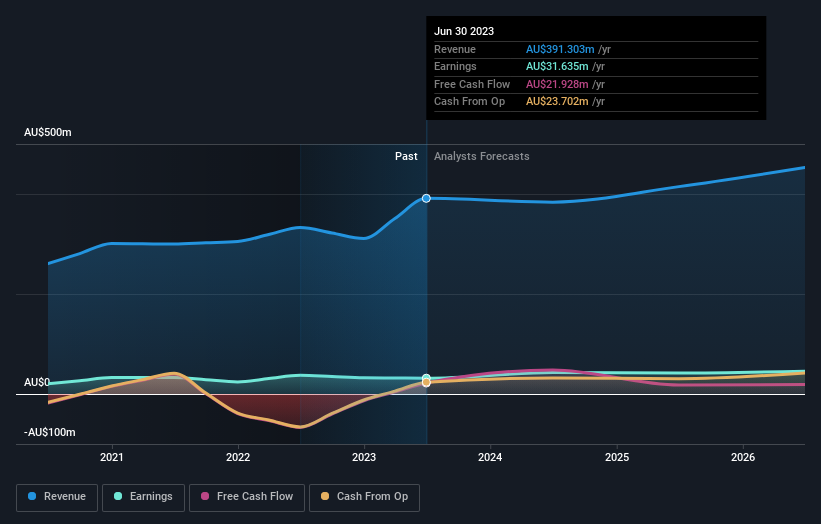Cedar Woods Properties Limited's (ASX:CWP) top owners are retail investors with 44% stake, while 23% is held by institutions
Key Insights
Cedar Woods Properties' significant retail investors ownership suggests that the key decisions are influenced by shareholders from the larger public
A total of 11 investors have a majority stake in the company with 51% ownership
If you want to know who really controls Cedar Woods Properties Limited (ASX:CWP), then you'll have to look at the makeup of its share registry. The group holding the most number of shares in the company, around 44% to be precise, is retail investors. Put another way, the group faces the maximum upside potential (or downside risk).
Institutions, on the other hand, account for 23% of the company's stockholders. Institutions often own shares in more established companies, while it's not unusual to see insiders own a fair bit of smaller companies.
Let's take a closer look to see what the different types of shareholders can tell us about Cedar Woods Properties.
See our latest analysis for Cedar Woods Properties
What Does The Institutional Ownership Tell Us About Cedar Woods Properties?
Many institutions measure their performance against an index that approximates the local market. So they usually pay more attention to companies that are included in major indices.
As you can see, institutional investors have a fair amount of stake in Cedar Woods Properties. This implies the analysts working for those institutions have looked at the stock and they like it. But just like anyone else, they could be wrong. It is not uncommon to see a big share price drop if two large institutional investors try to sell out of a stock at the same time. So it is worth checking the past earnings trajectory of Cedar Woods Properties, (below). Of course, keep in mind that there are other factors to consider, too.
Hedge funds don't have many shares in Cedar Woods Properties. Australian Super Pty Ltd is currently the largest shareholder, with 11% of shares outstanding. In comparison, the second and third largest shareholders hold about 10% and 6.1% of the stock. William Hames, who is the second-largest shareholder, also happens to hold the title of Top Key Executive.
A closer look at our ownership figures suggests that the top 11 shareholders have a combined ownership of 51% implying that no single shareholder has a majority.
While studying institutional ownership for a company can add value to your research, it is also a good practice to research analyst recommendations to get a deeper understand of a stock's expected performance. Quite a few analysts cover the stock, so you could look into forecast growth quite easily.
Insider Ownership Of Cedar Woods Properties
The definition of an insider can differ slightly between different countries, but members of the board of directors always count. Management ultimately answers to the board. However, it is not uncommon for managers to be executive board members, especially if they are a founder or the CEO.
Most consider insider ownership a positive because it can indicate the board is well aligned with other shareholders. However, on some occasions too much power is concentrated within this group.
Our information suggests that insiders maintain a significant holding in Cedar Woods Properties Limited. It has a market capitalization of just AU$386m, and insiders have AU$52m worth of shares in their own names. It is great to see insiders so invested in the business. It might be worth checking if those insiders have been buying recently.
General Public Ownership
With a 44% ownership, the general public, mostly comprising of individual investors, have some degree of sway over Cedar Woods Properties. This size of ownership, while considerable, may not be enough to change company policy if the decision is not in sync with other large shareholders.
Private Company Ownership
We can see that Private Companies own 19%, of the shares on issue. It might be worth looking deeper into this. If related parties, such as insiders, have an interest in one of these private companies, that should be disclosed in the annual report. Private companies may also have a strategic interest in the company.
Next Steps:
While it is well worth considering the different groups that own a company, there are other factors that are even more important. Like risks, for instance. Every company has them, and we've spotted 2 warning signs for Cedar Woods Properties (of which 1 makes us a bit uncomfortable!) you should know about.
Ultimately the future is most important. You can access this free report on analyst forecasts for the company.
NB: Figures in this article are calculated using data from the last twelve months, which refer to the 12-month period ending on the last date of the month the financial statement is dated. This may not be consistent with full year annual report figures.
Have feedback on this article? Concerned about the content? Get in touch with us directly. Alternatively, email editorial-team (at) simplywallst.com.
This article by Simply Wall St is general in nature. We provide commentary based on historical data and analyst forecasts only using an unbiased methodology and our articles are not intended to be financial advice. It does not constitute a recommendation to buy or sell any stock, and does not take account of your objectives, or your financial situation. We aim to bring you long-term focused analysis driven by fundamental data. Note that our analysis may not factor in the latest price-sensitive company announcements or qualitative material. Simply Wall St has no position in any stocks mentioned.

 Yahoo Finance
Yahoo Finance 

